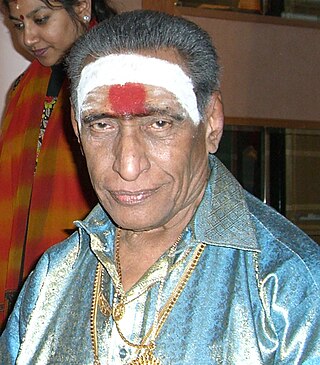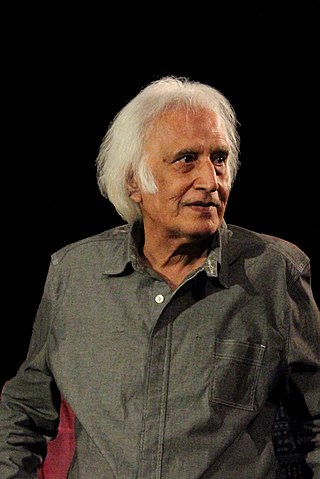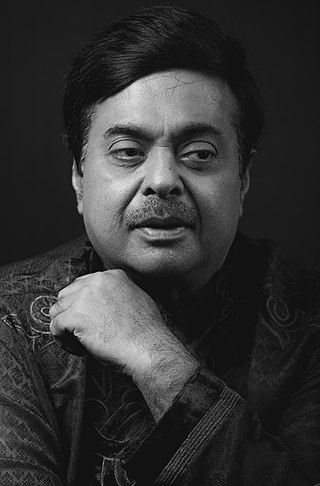Related Research Articles

Kunnakudi Vaidyanathan was an Indian classical music violinist and music composer.

Bansi Kaul was an Indian theatre director and the founder of Rang Vidushak, a theatre group in Bhopal. He was a recipient of the Padma Shri, India's fourth highest civilian honor, in 2014, and the Sangeet Natak Akademi Award in 1995. Some of his notable plays included Aala Afsar, Kahan Kabir, and Sidhi Dar Sidhi urf Tukke pe Tukka. He was a designer and associate show director for the 2010 Commonwealth Games opening ceremony and also the art director for the 1986 and 1987 Khajuraho Festival.

Ariyakudi Ramanuja Iyengar, popularly known as Ariyakudi, was a Carnatic music vocalist, born in Ariyakudi, a town in the present-day Sivaganga district of Tamil Nadu. Ariyakudi developed a unique style of singing which came to be known as The Ariyakudi Tradition and is followed by his students. He is credited with establishing the modern katcheri (concert) traditions in Carnatic music.

Safdar Hashmi was a communist playwright and director, best known for his work with street theatre in India. He was also an actor, lyricist, and theorist, and he is still considered an important voice in Indian political theatre. He was an activist of the Students' Federation of India (SFI).

Lalgudi Gopala Iyer Jayaraman was an Indian Carnatic violinist, vocalist and composer. He is commonly grouped with M.S. Gopalakrishnan and T.N.Krishnan as part of the violin trinity of Carnatic music. He was awarded the Padma Bhushan by the Government of India in 2001.
R. Parthasarathy, commonly known as Indira Parthasarathy or Ee. Paa., is an Indian author and playwright who writes in Tamil. He has published 16 novels, 10 plays, anthologies of short stories, and essays. He is best known for his plays, "Aurangzeb", "Nandan Kathai" and "Ramanujar".

M.S. Gopalakrishnan, a.k.a. MSG, was a violinist in the field of Carnatic music. He is commonly grouped with Lalgudi Jayaraman and T.N.Krishnan as part of the violin-trinity of Carnatic Music. He was awarded the Madras Music Academy's Sangeetha Kalanidhi in 1997. He was a recipient of the Padma Bhushan, Padma Shri, Kalaimamani, Sangeetha Kalanidhi and Sangeet Natak Akademi awards.
Ratan Thiyam is an Indian playwright and theatre director, and the winner of Sangeet Natak Akademi Award in 1987, one of leading figures of the "theatre of roots" movement in Indian theatre, which started in the 1970s. Also known as Thiyam Nemai, Ratan Thiyam is known for writing and staging plays that use ancient Indian theatre traditions and forms in a contemporary context. A former painter, and proficient in direction, design, script and music, Thiyam is often considered one of leading contemporary theatre gurus.

Sudhindra Sircar, also known as Badal Sarkar, was an influential Indian dramatist and theatre director, most known for his anti-establishment plays during the Naxalite movement in the 1970s and taking theatre out of the proscenium and into public arena, when he transformed his own theatre company, Shatabdi as a third theatre group. He wrote more than fifty plays of which Ebong Indrajit, Basi Khabar, and Saari Raat are well known literary pieces. A pioneering figure in street theatre as well as in experimental and contemporary Bengali theatre with his egalitarian "Third Theatre", he prolifically wrote scripts for his Aanganmanch performances, and remains one of the most translated Indian playwrights. Though his early comedies were popular, it was his angst-ridden Evam Indrajit that became a landmark play in Indian theatre. Today, his rise as a prominent playwright in 1960s is seen as the coming of age of Modern Indian playwriting in Bengali, just as Vijay Tendulkar did it in Marathi, Mohan Rakesh in Hindi, and Girish Karnad in Kannada.

Chandrashekhara Basavanneppa Kambara is a prominent Indian poet, playwright, folklorist, film director in Kannada language and the founder-vice-chancellor of Kannada University in Hampi also president of the Sahitya Akademi, country's premier literary institution, after Vinayak Krishna Gokak (1983) and U.R. Ananthamurthy (1993). He is known for effective adaptation of the North Karnataka dialect of the Kannada language in his plays, and poems, in a similar style as in the works of D.R. Bendre.

Habib Tanvir was one of the most popular Indian Urdu playwrights, a theatre director, poet and actor. He was the writer of plays such as, Agra Bazar (1954) and Charandas Chor (1975). A pioneer in Urdu and Hindi theatre, he was most known for his work with Chhattisgarhi tribals, at the Naya Theatre, a theatre company he founded in 1959 in Bhopal. He went on to include indigenous performance forms such as nacha, to create not only a new theatrical language, but also milestones such as Charandas Chor, Gaon ka Naam Sasural, Mor Naam Damad and Kamdeo ka Apna Basant Ritu ka Sapna.
Jana Natya Manch is a New Delhi–based amateur theatre company specialising in left-wing street theatre in Hindi. It was founded in 1973 by a group of Delhi's radical theatre amateurs who sought to take theatre to the people. Theatre personality Safdar Hashmi is the best-known figure associated with the troupe.
Padma Shri Na Muthuswamy was the art director of Tamil folk theatre group Koothu-P-Pattarai, which is based in Chennai, Tamil Nadu in South India.

Leela Samson is a Bharatanatyam dancer, choreographer, instructor, writer and actress from India. As a soloist, she is known for her technical virtuosity and has taught Bharatanatyam at Shriram Bhartiya Kala Kendra in Delhi for many years.

Surendra Verma is a leading Hindi litterateur and playwright. He started out as a playwright, when his play Surya Ki Antim Kiran Se Surya Ki Pahli Kiran Tak became quite well known; it has been translated into six Indian languages. He has had a long association with the National School of Drama.and has published about fifteen titles of short stories, satires, novels and plays.

Shekhar Sen is a singer, a music composer, a lyricist, and an actor.

Singanallur Venkataramana Iyer Sahasranamam, also known as S. V. S., was an Indian actor and director. Primarily a theatre actor, he also worked in over 200 films, mainly in Tamil cinema.
Madras Kadiravelu Saroja, was an Indian classical dancer, known for her expertise, as an exponent and as a teacher, in the classical dance form of Bharatanatyam. The Government of India honored her, in 2011, with the Padma Shri, the fourth highest civilian award, for her services to the field of art and culture.
Govind Ram Nirmalkar (1935–2014) was an Indian actor and folk theatre artist, known for his contributions to the Nacha folk theatre of Chhattisgarh. His portrayal of the protagonist in Charan Das Chor, an award winning play by Habib Tanveer, won him critical acclaim. The Government of India awarded him the fourth highest civilian honour of the Padma Shri, in 2009, for his contributions to Arts. He was also a recipient of the 2012 Sangeet Natak Akademi Award.

Subbu Arumugam was an Indian musician, writer and Villupattu theatre art exponent. In 2021, he was awarded India's fourth-highest civilian award the Padma Shri in the Arts and Literature category. He published 15 books containing Villu Pattu narratives, songs, short stories and novels such as Veera Pandia Kattabomman. Some of his published notable works are Noolaga Villisai, Ramayanam, and Villisai Mahabharatham.
References
- ↑ "Sangeet Natak Akademy awards conferred". The Hindu . 7 September 2013. Retrieved 22 May 2014.
- 1 2 3 4 T. Saravanan (13 October 2011). "Looking beyond the boundary". The Hindu . Retrieved 22 May 2014.
- ↑ "Poignant portrayal". The Hindu . 16 January 2013. Retrieved 22 May 2014.